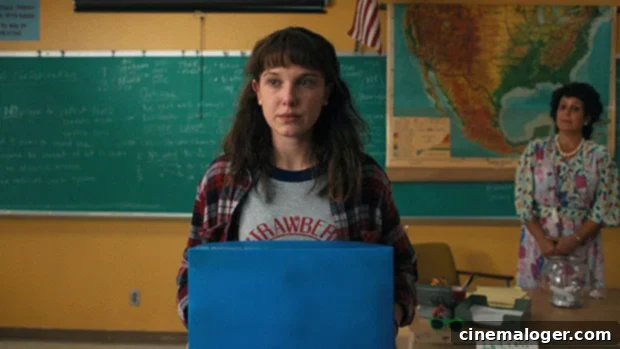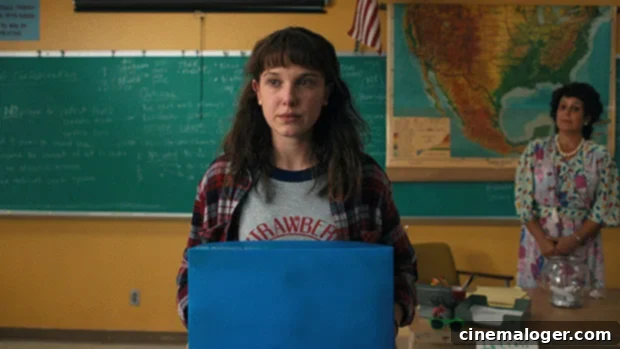Stranger Things: Duffer Brothers Respond to Millie Bobby Brown’s Plea for More Character Deaths in the Final Season
The highly anticipated final season of Netflix’s global phenomenon, Stranger Things, has become a hotbed for speculation, not just about the fate of Hawkins but also the lives of its beloved characters. At the center of a recent debate is none other than star Millie Bobby Brown, who portrays the telekinetic hero Eleven. Brown candidly expressed her desire for a higher body count in the series, leading the show’s creators, the Duffer Brothers, to publicly defend their narrative approach.
Millie Bobby Brown’s Bold Call for More Fatalities
Back in May, 18-year-old Millie Bobby Brown didn’t mince words when discussing the ever-expanding ensemble cast of Stranger Things. Her concern stemmed from the logistical challenges of managing such a large group of characters, even recalling difficulties getting everyone into a single photo at the Season 4 premiere. “You need to start killing people off,” she emphatically told The Wrap. Brown went on to playfully, yet pointedly, criticize the showrunners, stating, “The Duffer Brothers are sensitive sallies who don’t want to kill anybody off. We need to have the mindset of ‘Game of Thrones.’ Kill me off! They tried killing David off and they brought him back!” Her provocative comments ignited a lively discussion among fans and media alike, questioning whether the Duffer Brothers’ commitment to keeping their core cast alive was truly serving the show’s dramatic potential.
Millie Bobby Brown may want to see a bunch of people die in the final season of STRANGER THINGS but it sounds like the Duffers have other plans.
Our hour long spoiler chat is available at https://t.co/e84WokCDhq pic.twitter.com/HRjy6jTcWR
— Josh Horowitz (@joshuahorowitz) July 7, 2022
The Duffer Brothers’ Measured Response: Hawkins is Not Westeros
The Duffer Brothers, Matt and Ross Duffer, addressed Brown’s candid remarks during an interview with Josh Horowitz on his Happy Sad Confused podcast. Matt Duffer, 38, responded with a laugh when Horowitz brought up Millie’s statements during the July 4 episode. He initially confirmed that the cast members, including Millie, are intentionally kept in the dark about upcoming plot twists, hinting that “a lot more is on the table” for the final season. He then directly tackled Millie’s “sensitive sallies” comment, affectionately calling the British actor “hilarious” and appreciating her passion.
However, Matt Duffer quickly shifted to a more serious defense of their creative process. “Believe us, we’ve explored all of it, all options in the writing room,” he explained. He then elaborated on the fundamental difference between Stranger Things and a show like Game of Thrones, which is renowned for its high character mortality rate. “Just as a complete hypothetical, you kill Mike, it’s like… that’s depressing, we’re not depressing — we aren’t Game of Thrones. This is Hawkins, it’s not Westeros. The show becomes not Stranger Things anymore because you do have to treat it realistically.”
This comparison highlights a core philosophical distinction in storytelling. While Game of Thrones thrived on unpredictability and the brutal reality of its world, often sacrificing beloved characters to advance its plot or demonstrate stakes, Stranger Things has always maintained a balance between horror and heartwarming camaraderie. The Duffer Brothers emphasize that the emotional core of their series lies in the relationships and resilience of its main group. Erasing a central figure like Mike Wheeler, or any of the core kids, would not only drastically alter the tone but also potentially betray the show’s established identity and its unique blend of sci-fi, horror, and coming-of-age drama.
The Profound Impact of Death in Hawkins
Matt Duffer further elaborated on the deep repercussions that even a single character death carries within the Stranger Things universe. Unlike shows where deaths can be numerous and sometimes fleeting, each loss in Hawkins is designed to resonate deeply with the surviving characters and the audience. “When Barb dies, it’s two seasons worth of grappling with that,” he pointed out, referring to the tragic and widely mourned death of Barbara Holland in Season 1, which served as a significant driving force for Nancy Wheeler’s character arc and the wider community’s awareness of the Upside Down. “So imagine Mike dying, it’s like is that something we’re interested in exploring or not interested in exploring? Eddie’s death is going to have huge repercussions on season five,” he continued.
The Duffer Brothers’ approach underscores that “every death has impact.” The recent sacrifice of Eddie Munson in Season 4, a character who quickly became a fan favorite, vividly illustrates this principle. His heroic but tragic end left a profound emotional mark on Dustin Henderson and the entire group, ensuring his legacy will loom large over the final battle against Vecna. This commitment to allowing grief and consequences to play out realistically reinforces the idea that character deaths are not mere plot devices but significant narrative events that shape the ongoing story and emotional landscape of Hawkins. As they move into the climactic final season, Matt added, “I think more of that’s on the table because … we’ll see.” This suggests that while mass killings might be off the table, the stakes will undoubtedly be higher, and painful losses remain a possibility.
Further defending his and his brother Ross’s creative decisions, Matt Duffer stressed that there is a well-thought-out “logic” behind every plot point and character’s journey. This assurance aims to calm fears that storytelling choices are arbitrary, emphasizing instead a meticulous crafting of the narrative arc for the series’ grand finale.

Season 4’s High Stakes and Lingering Threats
The long-awaited fourth season of the hit Netflix series delivered on its promise of darker themes and higher stakes. Part one debuted in May, followed by the two feature-length episodes of part two on July 1. This season introduced the terrifying new antagonist, Vecna, and pushed the characters to their absolute limits. While the season saw several significant deaths, notably Eddie Munson, who became an instant fan favorite with his charismatic personality and heroic sacrifice, the core group of protagonists — Millie Bobby Brown’s Eleven, Finn Wolfhard’s Mike, Gaten Matarazzo’s Dustin, Caleb McLaughlin’s Lucas, Noah Schnapp’s Will, and Sadie Sink’s Max, along with the older teens and adults — largely survived. However, their survival came at a cost, leaving many of them physically and emotionally scarred, hinting at the profound challenges that await them in the ultimate showdown.
The events of Season 4 culminated in a devastating attack on Hawkins, with the Upside Down bleeding into their reality. Max Mayfield’s near-fatal encounter with Vecna, leaving her in a coma, serves as a poignant reminder that even without outright death, characters can suffer deeply, and their fates can hang precariously in the balance. This sense of peril, without necessarily resorting to a high body count among the main cast, effectively raises the stakes for the final installment.
Anticipating the Epic Conclusion: Stranger Things Season 5
The fifth and final season of Stranger Things is expected to be released in 2024, though an official date has yet to be confirmed. The journey to the Upside Down’s final confrontation is a meticulous process, as detailed by David Harbour, who brilliantly portrays the resilient former Hawkins Police Chief Hopper. He told GQ UK on July 4, “I think we’ll [shoot] next year. They’re finishing writing it this year, and they need to prep and stuff, so hopefully it’ll be this year. But I think that’s the plan. So it’d probably come out mid-2024, based on our track record.”
The Duffer Brothers face the monumental task of delivering a satisfying conclusion to one of the most beloved shows of the last decade. This involves not only resolving the overarching conflict with the Upside Down and its terrifying inhabitants but also providing meaningful closure for each character’s journey. Fans are eager to see how Eleven will fully harness her powers, how the Byers family and Hopper will navigate their reunion, and what ultimate sacrifices will be demanded to save Hawkins – and potentially the world – from total annihilation. The promise of a truly epic final season, where “a lot more is on the table,” keeps viewers on the edge of their seats, speculating on every twist and turn, and every character’s ultimate fate, even if a mass culling isn’t the Duffer Brothers’ preferred narrative strategy.
The debate between Millie Bobby Brown’s desire for more dramatic character exits and the Duffer Brothers’ commitment to their established storytelling philosophy highlights the creative tension inherent in concluding a sprawling narrative. Ultimately, their aim is to craft a finale that feels earned, impactful, and true to the heart of Stranger Things, balancing the necessary dangers with the enduring spirit of friendship and courage that defines the show.
